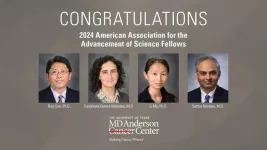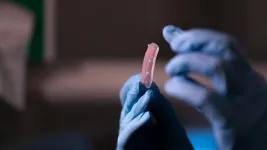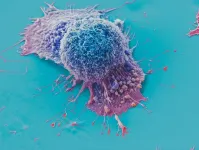(Press-News.org) HOUSTON ― In recognition of their significant achievements in the realm of cancer care and research, four researchers at The University of Texas MD Anderson Cancer Center have been elected fellows of the American Association for the Advancement of Science (AAAS). This prestigious distinction stands as one of the highest accolades within the scientific research community.
Boyi Gan, Ph.D., Candelaria Gomez-Manzano, M.D., Li Ma, Ph.D., and Sattva Neelapu, M.D., now join this esteemed group of fellows elected by their peers. AAAS’s annual tradition of recognizing leading scientists as fellows dates to 1874. With these newest additions, 68 MD Anderson faculty members have been elected AAAS Fellows.
"We proudly congratulate Drs. Gan, Gomez-Manzano, Ma and Neelapu for their outstanding dedication and innovative contributions to cancer care and research," said Peter WT Pisters, M.D., president of MD Anderson. “This group exemplifies MD Anderson’s commitment to breakthrough science, and these individuals are highly deserving of this honor from AAAS.”
MD Anderson’s research environment provides unique opportunities for seamless collaboration between clinicians and scientists, allowing new insights to flow from the lab to the clinic and back. Breakthroughs from the lab can rapidly be developed into new therapies to be evaluated in the clinic, and clinical results can guide laboratory studies in real time. This virtuous cycle of innovation, grounded in collaboration, connectivity and data-based science, accelerates discoveries in ways not possible at other institutions.
Gan, professor of Experimental Radiation Oncology, was elected for his contributions to understanding and targeting ferroptosis in cancer and to discovering disulfidptosis as a new form of regulated cell death. He is recognized worldwide as a leader for these achievements and for the development of novel cancer therapies targeting these pathways. Gan currently serves as director of the Radiation and Cancer Metabolism Research Program in Division of Radiation Oncology and leads Acquired Resistance to Therapy and Iron (ARTI) Center at MD Anderson.
Gomez-Manzano, professor of Neuro-Oncology, was elected for her contributions to generating engineered oncolytic adenoviruses, which target and destroy cancer cells while minimizing the negative impact on normal cells, to treat adult and pediatric tumors. She is also recognized for her work in propelling cancer viro-immunotherapy. Gomez-Manzano serves as co-lead of MD Anderson’s Glioblastoma Moon Shot® and co-lead of the Neuro-Neoplasm Initiative within MD Anderson’s Cancer Neuroscience Program.
Ma, professor of Experimental Radiation Oncology, was elected for her fundamental discoveries of cancer spread and resistance to treatment that have transformed the field, including pioneering work on the role of long non-coding RNAs in metastasis. As a prominent scientist in the field, she has reached numerous significant research milestones and has authored more than 65 papers in leading peer-reviewed journals.
Neelapu, professor of Lymphoma and Myeloma, was selected for his clinical and translational research, focusing on developing novel immunotherapeutic strategies for patients with lymphoma. Through his contributions, expertise and leadership, Neelapu has earned recognition nationally and internationally in the field of chimeric antigen receptor (CAR) T cell therapy. As a physician-scientist, his contributions to clinical and translational research have resulted in at least two Food and Drug Administration approvals and multiple patent filings of novel immune and cell therapy approaches that soon will be evaluated in clinic.
"The AAAS Fellows are composed of exceptional scientists whose outstanding research achievements showcase the transformative influence of science on our world," said Giulio Draetta, M.D., Ph.D., chief scientific officer at MD Anderson. “We celebrate these distinguished MD Anderson scientists, who epitomize our continual dedication to progress in cancer care, research and prevention.”
END
Four MD Anderson researchers elected AAAS Fellows
Clinicians and scientists recognized for achievements in advancing cancer care and research
2024-04-18
ELSE PRESS RELEASES FROM THIS DATE:
Computational biology pioneer Katie Pollard elected as AAAS fellow
2024-04-18
SAN FRANCISCO—April 18, 2024—The American Association for the Advancement of Science (AAAS), one of the world’s largest general scientific societies, has elected Gladstone Senior Investigator Katie Pollard, PhD, into its new class of AAAS Fellows, a lifetime honor within the scientific community.
AAAS recognized Pollard for her “distinguished contributions to the field of computational biology and bioinformatics, particularly her discovery of Human Accelerated Regions, and development of ...
New “window-of-opportunity” clinical trials explore cutting-edge treatments for cancers of the liver, head and neck
2024-04-18
April 18, 2024, TORONTO – A new round of clinical trials supported by the Ontario Institute for Cancer Research (OICR) will harness a unique opportunity to test some of the newest treatment strategies for a range of different cancers.
OICR has announced two new clinical trials as part of its Window-of-Opportunity (WOO) Network, which brings together Ontario researchers, clinicians and patients to study the biology of newly diagnosed and recurrent tumours.
“‘Window-of-opportunity’ clinical trials take advantage of the two-to-eight-week period between the diagnosis of cancer and the surgery to remove the cancer, at ...
Can bismuth prevent oil leaks – (and save Norwegians billions)?
2024-04-18
Over the next 25 years, as the world shifts away from fossil fuels, the oil and gas wells that have sustained the fossil fuel age will have to be plugged.
No big deal, you might think, drilling those wells was the hard part. Plugging them should be no problem. But think again.
The Norwegian Continental Shelf, as an example, is punctured by more than 2000 wells. Harald Linga, centre director for SWIPA (see box), a Centre for Research Based Innovation based at SINTEF, Scandinavia’s largest independent research institute, estimates that plugging them using today’s technology will cost upwards of NOK 800 billion – that’s USD 73 billion.
And while oil ...
Atmospheric isotopes reveal 4.5 billion years of volcanism on Jupiter’s moon Io
2024-04-18
Sulfur and chlorine isotopes in the atmosphere of Jupiter’s moon Io indicate that it has been volcanically active for the entire 4.57 billion-year history of the Solar System, according to a new study. The findings offer new insights into the moon’s history. Io is the most volcanically active body in the Solar System. This extreme level of volcanic activity is the result of tidal heating from friction generated within the moon’s interior as it is pulled between Jupiter and its neighboring moons of Europa and Ganymede. However, how long Io has hosted such extensive ...
An ink for 3D-printing flexible devices without mechanical joints
2024-04-18
For engineers working on soft robotics or wearable devices, keeping things light is a constant challenge: heavier materials require more energy to move around, and – in the case of wearables or prostheses – cause discomfort. Elastomers are synthetic polymers that can be manufactured with a range of mechanical properties, from stiff to stretchy, making them a popular material for such applications. But manufacturing elastomers that can be shaped into complex 3D structures that go from rigid to rubbery has been unfeasible until now.
“Elastomers are usually cast so that their composition cannot be changed in all three dimensions over short length scales. To overcome ...
Association for Chemoreception Sciences (AChemS) 46th Annual Meeting
2024-04-18
Media Contact:
Dr. Alissa Nolden, Chair - Public Information & Affairs Committee, anolden@umass.edu
Bonita Springs, FL— The Association for Chemoreception Sciences (AChemS) stands as a premier organization dedicated to advancing the understanding of chemosensory systems. With a rich history spanning over four decades, AChemS has played a pivotal role in fostering interdisciplinary research and collaboration in the fields of taste, smell, and chemical senses. AChemS provides a platform for scientists, clinicians, and industry members from diverse backgrounds to exchange ideas, present cutting-edge research findings, and address pressing challenges ...
How the Birmingham Drug Discovery Hub created an investment-ready ‘drug library’
2024-04-18
A novel approach to drug discovery is enabling University of Birmingham researchers to overcome the ‘valley of death’, where projects fail due to the funding gap between original research and commercial investment.
The approach, detailed in a feature published in the April issue of Drug Discovery Today, has attracted more than £4m in industry funding, grants and industry awards, on the back of just £0.2m investment from the University’s Dynamic Investment Fund (DIF).
The Birmingham Drug Discovery Hub ...
Scientists uncover 95 regions of the genome linked to PTSD
2024-04-18
In posttraumatic stress disorder (PTSD), intrusive thoughts, changes in mood, and other symptoms after exposure to trauma can greatly impact a person’s quality of life. About 6 percent of people who experience trauma develop the disorder, but scientists don’t yet understand the neurobiology underlying PTSD.
Now, a new genetic study of more than 1.2 million people has pinpointed 95 loci, or locations in the genome, that are associated with risk of developing PTSD, including 80 that had not been previously identified. The study, from the PTSD working group within the Psychiatric Genomics Consortium (PGC - PTSD) together with Cohen ...
AI tool predicts responses to cancer therapy using information from each cell of the tumor
2024-04-18
With more than 200 types of cancer and every cancer individually unique, ongoing efforts to develop precision oncology treatments remain daunting. Most of the focus has been on developing genetic sequencing assays or analyses to identify mutations in cancer driver genes, then trying to match treatments that may work against those mutations.
But many, if not most, cancer patients do not benefit from these early targeted therapies. In a new study published on April 18, 2024, in the journal Nature Cancer, first author Sanju Sinha, Ph.D., assistant professor in the Cancer Molecular Therapeutics ...
CEOs’ human concern translates into higher stock price
2024-04-18
Compassionate leadership has tangible benefits: CEOs’ expressions of empathy correlate with positive stock performance, a study led by the University of Zurich shows. The researchers analyzed data from conference calls between CEOs and financial analysts during the COVID-19 pandemic.
The COVID-19 pandemic prompted an unprecedented financial crisis. Between 24 February 2020, and 20 March 2020, the value of U.S. companies on the stock market decreased significantly, surpassing the decline during the 2008-2009 financial crisis.
At the onset of the pandemic, several CEOs made statements ...
LAST 30 PRESS RELEASES:
ASU researchers to lead AAAS panel on water insecurity in the United States
ASU professor Anne Stone to present at AAAS Conference in Phoenix on ancient origins of modern disease
Proposals for exploring viruses and skin as the next experimental quantum frontiers share US$30,000 science award
ASU researchers showcase scalable tech solutions for older adults living alone with cognitive decline at AAAS 2026
Scientists identify smooth regional trends in fruit fly survival strategies
Antipathy toward snakes? Your parents likely talked you into that at an early age
Sylvester Cancer Tip Sheet for Feb. 2026
Online exposure to medical misinformation concentrated among older adults
Telehealth improves access to genetic services for adult survivors of childhood cancers
Outdated mortality benchmarks risk missing early signs of famine and delay recognizing mass starvation
Newly discovered bacterium converts carbon dioxide into chemicals using electricity
Flipping and reversing mini-proteins could improve disease treatment
Scientists reveal major hidden source of atmospheric nitrogen pollution in fragile lake basin
Biochar emerges as a powerful tool for soil carbon neutrality and climate mitigation
Tiny cell messengers show big promise for safer protein and gene delivery
AMS releases statement regarding the decision to rescind EPA’s 2009 Endangerment Finding
Parents’ alcohol and drug use influences their children’s consumption, research shows
Modular assembly of chiral nitrogen-bridged rings achieved by palladium-catalyzed diastereoselective and enantioselective cascade cyclization reactions
Promoting civic engagement
AMS Science Preview: Hurricane slowdown, school snow days
Deforestation in the Amazon raises the surface temperature by 3 °C during the dry season
Model more accurately maps the impact of frost on corn crops
How did humans develop sharp vision? Lab-grown retinas show likely answer
Sour grapes? Taste, experience of sour foods depends on individual consumer
At AAAS, professor Krystal Tsosie argues the future of science must be Indigenous-led
From the lab to the living room: Decoding Parkinson’s patients movements in the real world
Research advances in porous materials, as highlighted in the 2025 Nobel Prize in Chemistry
Sally C. Morton, executive vice president of ASU Knowledge Enterprise, presents a bold and practical framework for moving research from discovery to real-world impact
Biochemical parameters in patients with diabetic nephropathy versus individuals with diabetes alone, non-diabetic nephropathy, and healthy controls
Muscular strength and mortality in women ages 63 to 99
[Press-News.org] Four MD Anderson researchers elected AAAS FellowsClinicians and scientists recognized for achievements in advancing cancer care and research




